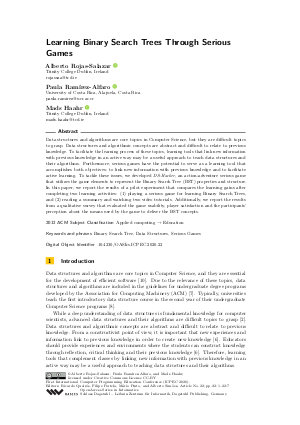Learning Binary Search Trees Through Serious Games
Authors
Alberto Rojas-Salazar  ,
Paula Ramírez-Alfaro
,
Paula Ramírez-Alfaro  ,
Mads Haahr
,
Mads Haahr 
-
Part of:
Volume:
First International Computer Programming Education Conference (ICPEC 2020)
Part of: Series: Open Access Series in Informatics (OASIcs)
Part of: Conference: International Computer Programming Education Conference (ICPEC) - License:
 Creative Commons Attribution 3.0 Unported license
Creative Commons Attribution 3.0 Unported license
- Publication Date: 2020-06-15
File

PDF
OASIcs.ICPEC.2020.22.pdf
- Filesize: 373 kB
- 7 pages
Document Identifiers
Subject Classification
ACM Subject Classification
- Applied computing → Education
Keywords
- Binary Search Tree
- Data Structures
- Serious Games
Metrics
- Access Statistics
-
Total Accesses (updated on a weekly basis)
0PDF Downloads0Metadata Views
Abstract
Data structures and algorithms are core topics in Computer Science, but they are difficult topics to grasp. Data structures and algorithmic concepts are abstract and difficult to relate to previous knowledge. To facilitate the learning process of these topics, learning tools that link new information with previous knowledge in an active way may be a useful approach to teach data structures and their algorithms. Furthermore, serious games have the potential to serve as a learning tool that accomplishes both objectives: to link new information with previous knowledge and to facilitate active learning. To tackle these issues, we developed DS-Hacker, an action-adventure serious game that utilizes the game elements to represent the Binary Search Tree (BST) properties and structure. In this paper, we report the results of a pilot experiment that compares the learning gains after completing two learning activities: (1) playing a serious game for learning Binary Search Trees, and (2) reading a summary and watching two video tutorials. Additionally, we report the results from a qualitative survey that evaluated the game usability, player satisfaction and the participants' perception about the means used by the game to deliver the BST concepts.
Cite As Get BibTex
Alberto Rojas-Salazar, Paula Ramírez-Alfaro, and Mads Haahr. Learning Binary Search Trees Through Serious Games. In First International Computer Programming Education Conference (ICPEC 2020). Open Access Series in Informatics (OASIcs), Volume 81, pp. 22:1-22:7, Schloss Dagstuhl – Leibniz-Zentrum für Informatik (2020)
https://doi.org/10.4230/OASIcs.ICPEC.2020.22
BibTex
@InProceedings{rojassalazar_et_al:OASIcs.ICPEC.2020.22,
author = {Rojas-Salazar, Alberto and Ram{\'\i}rez-Alfaro, Paula and Haahr, Mads},
title = {{Learning Binary Search Trees Through Serious Games}},
booktitle = {First International Computer Programming Education Conference (ICPEC 2020)},
pages = {22:1--22:7},
series = {Open Access Series in Informatics (OASIcs)},
ISBN = {978-3-95977-153-5},
ISSN = {2190-6807},
year = {2020},
volume = {81},
editor = {Queir\'{o}s, Ricardo and Portela, Filipe and Pinto, M\'{a}rio and Sim\~{o}es, Alberto},
publisher = {Schloss Dagstuhl -- Leibniz-Zentrum f{\"u}r Informatik},
address = {Dagstuhl, Germany},
URL = {https://drops.dagstuhl.de/entities/document/10.4230/OASIcs.ICPEC.2020.22},
URN = {urn:nbn:de:0030-drops-123097},
doi = {10.4230/OASIcs.ICPEC.2020.22},
annote = {Keywords: Binary Search Tree, Data Structures, Serious Games}
}
Author Details
References
-
Lorin W. Anderson and David R. Krathwohl. A taxonomy for learning, teaching, and assessing: a revision of Bloom’s taxonomy of educational objectives. Longman, New York, 2001.

- Katrin Becker and Melissa Beacham. A Tool for Teaching Advanced Data Structures to Computer Science Students: An Overview of the BDP System. In Proceedings of the Second Annual CCSC on Computing in Small Colleges Northwestern Conference, pages 65-71, USA, 2000. Consortium for Computing Sciences in Colleges. event-place: Oregon Graduate Institute, Beaverton, Oregon, USA. URL: http://dl.acm.org/citation.cfm?id=369274.369319.
- D. Dicheva and A. Hodge. Active Learning Through Game Play in a Data Structures Course. In Proceedings of the 49th ACM Technical Symposium on Computer Science Education, SIGCSE '18, pages 834-839, New York, NY, USA, 2018. ACM. event-place: Baltimore, Maryland, USA. URL: https://doi.org/10.1145/3159450.3159605.
- Michael Eagle and Tiffany Barnes. Experimental Evaluation of an Educational Game for Improved Learning in Introductory Computing. In Proceedings of the 40th ACM Technical Symposium on Computer Science Education, SIGCSE '09, pages 321-325, New York, NY, USA, 2009. ACM. event-place: Chattanooga, TN, USA. URL: https://doi.org/10.1145/1508865.1508980.
-
James Paul Gee. What Video Games Have to Teach Us about Learning and Literacy. Palgrave Macmillan, New York, 2nd edition, 2007.

- Aytac Gogus. Constructivist Learning. In Norbert M. Seel, editor, Encyclopedia of the Sciences of Learning, pages 783-786. Springer US, Boston, MA, 2012. URL: https://doi.org/10.1007/978-1-4419-1428-6_4049.
-
Association for Computing Machinery (ACM) Joint Task Force on Computing Curricula and IEEE Computer Society. Computer Science Curricula 2013: Curriculum Guidelines for Undergraduate Degree Programs in Computer Science. ACM, New York, NY, USA, 2013.

- R. Lawrence. Teaching data structures using competitive games. IEEE Transactions on Education, 47(4):459-466, November 2004. URL: https://doi.org/10.1109/TE.2004.825053.
-
Rafael Moreno, Rafael Martínez, and José Muñiz. Directrices para la construcción de ítems de elección múltiple. Psicothema, 16(3):490-497, 2004.

-
Robert Sedgewick and Kevin Wayne. Algorithms. Addison-Wesley, 4th edition, 2014.

